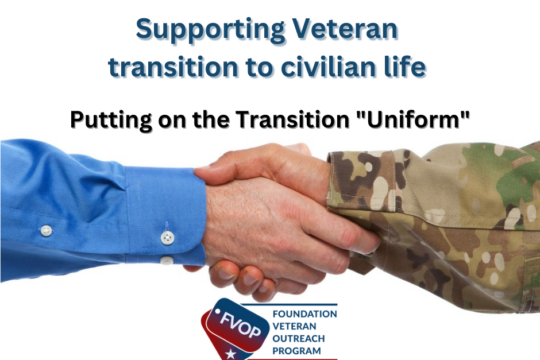
Departing from the structure of military life is more than just a change of residence…it’s a complete revamping of day-to-day existence. Stepping away from a structured environment, where roles are defined and where a close-knit relationship with teammates shapes activities, often produces a period of adjustment that can be disorienting. This disorientation leads many transitioning veterans to experience a level of stress that can be challenging for many.
The Pew Research Center has studied this issue of transitional stress extensively, concluding that more than a quarter of military Veterans leaving active duty face difficulties making the transition. For Veterans serving in the years after the September 11, 2001, terrorist attacks, Pew Research found that the challenges were even more acute, with almost half citing difficulties readjusting to civilian life.
Recognizing the pervasiveness of this transitional stress problem, the AMAC Foundation’s Veteran Outreach Program (FVOP) has identified “Veteran transition to civilian life” as one of its four focus areas for supporting the Veteran community. Since FVOP’s launch two years ago, the program has cataloged hundreds of programs and services specifically aimed at easing the transition from military life to civilian life. Working in collaboration with a network of organizations similarly dedicated to supporting the Veteran community, FVOP seeks to increase awareness of programs concentrating on this challenge faced by our military personnel.
Looking at the Causes
Studies seeking to isolate the reasons why Veterans exiting military life face challenges are numerous, and many of them tend to single out issues like social reintegration, adapting to changes in family structure, or difficulties in finding specific services tailored to the needs of Veterans. But one of the most common challenges has been finding employment.
A recent Veterans of Foreign Wars (VFW) study addressed the transitional challenge issue, noting that “Finding a job topped the list, with a third (33%) of respondents calling it their biggest hurdle.” For this reason, FVOP has also cataloged hundreds of employment sources and job preparation aids for transitioning Veterans, ranging from recurring employment fairs to support groups to resume preparation assistance and beyond.
Since many transitioning Veterans tend to combine job training with their job seeking efforts, we take note of a recent announcement by Veteran-founded National University (NU.edu) highlighting their formation of a new student support hub linked to a newly redesigned Veterans & Military Community Center addressing the needs of military-connected learners. The Center, funded in part via a U.S. Department of Veterans Affairs Veteran and Spouse Transitional Assistance Grant Program (VSTAGP) includes a career services arm that “empowers veterans, military spouses, and caregivers to transition successfully into civilian careers especially in high-demand fields like cybersecurity, IT, and K-12 education.” Read the official NU announcement press release here.
The National University movement toward transitional assistance for Veterans via training and career services aligns closely with Veterans Day News comments related to a OnePoll survey of transitioned military veterans. Finding a job and a purposeful career comprised more than half of the challenges Veterans faced, indicating that efforts like the NU student support hub can play a significant role in alleviating the transitional stress that often accompanies disengagement from military life.
Subscribe
Sign Up for Our E-Newsletter!
Stay up-to-date on all of the topics you care about by subscribing to our quarterly newsletter emailed directly to your inbox!
SubscribeSubscribe
Sign Up for Our E-Newsletter!
Stay up-to-date on all of the topics you care about by subscribing to our quarterly newsletter emailed directly to your inbox!
Subscribe